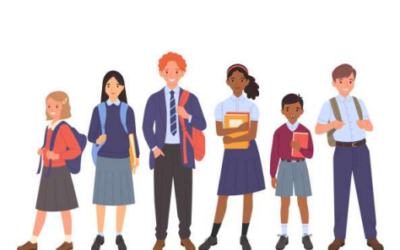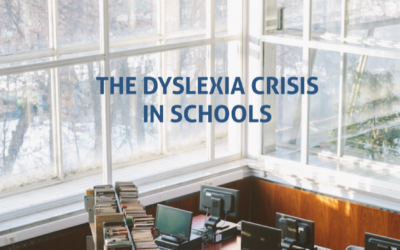"Children with dyslexia often exhibit increased variability in sensory and cognitive aspects of hearing relative to typically developing peers." - Hornickel et al., 2012 PNAS There is a long research history establishing auditory processing difficulties among...
My Pandemic Hack for Classes
Shelley Wear, a long-time volunteer on our Dyslexic Advantage editorial team shared these pandemic hacks for her classroom. Thanks Shelley! "The struggle is real to make sure students understand what you are saying with a mask on. I purchased a personal amplifier...
Dyslexia Advocacy: Say Dyslexia 2.0
From Chalkbeat's story, "NYC plans to screen nearly 200,000 students in the early grades to uncover struggling readers. Then what?" "In a massive bid to gauge reading skills following COVID-related learning disruptions, New York City’s education department is...
I Never Thought I’d Be Homeschooling… [Premium]
We never thought we would be homeschooling when we started almost 2 decades ago. What our family can say today, is that looking back, we’re so grateful for our entire homeschooling journey – even though initially homeschooling chose us rather than the other way around. Today there are so many reasons to homeschool and ways that homeschooling can also be a good fit for dyslexic students, so take heart in the adventure ahead of you and may the coming year be one good surprise after another. WHY HOMESCHOOLING CAN BE A GOOD MATCH FOR MANY STUDENTS Schooling at an Individual Pace The first reason why homeschooling can be a good match for many students is that traditional schooling can be a […]
The Dyslexia Crisis in Schools
The house is on fire. There is a conflagration of factors coming together that are affecting dyslexic students in public school beyond COVID. COVID certainly has its share of blame and breaking the camel's back when it comes to providing essential services to...
Supporting Young Dyslexics during the Pandemic
With all the continued upheaval due the pandemic, here's some advice for trying to keep the big picture of the coming school year. DYSLEXIC DEVELOPMENT HAS ITS OWN TIME TABLE There can be a very late bloom for a lot of the younger years for dyslexics - so don't...
What Kind of Dysgraphia [Premium]
A recent clinical review of dysgraphia has defined dysgraphia in the following way: “At its broadest definition, dysgraphia is a disorder of writing ability at any stage, including problems with letter formation/legibility, letter spacing, spelling, fine motor coordination, rate of writing, grammar, and composition.” Developmental dysgraphia (i.e. dysgraphia not based on some known injury) is described in the same article as having a “difficulty in acquiring writing skills despite sufficient learning opportunity and cognitive potential.” When a teacher or other professional asks a parent about “what type of dysgraphia their student might have,” they may be referring to the so-called “5 Types of Dysgraphia”, that often include, “motor”, “dyslexic”, “spatial”, and so on – but these distinctions are rarely clear-cut in real life and […]
Preparing with Templates and Posters [Premium]
When interviewing accomplished people of all sorts who are also dyslexic, there are some recurring themes – and one is, “I learned how to do the ‘dyslexic thing,’ you know, overprepare.” In some cases that means committing more hours to something – whether it was oral presentation or final project or job rotation. But often, it’s not just extra time spent; it’s also learning how to streamline certain repetitive features along the lines of “plan better” and not just “work more.” I was recently reminded of this when a social worker posted her work hacks for school and for work. One example is creating a template for her case notes: The template streamlines repetitive information that needs to be covered and reduces […]
Creating An Environment That Works [Premium]
Sunlight, air, water, nutrients…we know these are the things that allow plants to grow and flourish, but what are the same essential factors for dyslexic students or employees? FLEXIBILITY AND SOME CREATIVITY Good environments for dyslexics tend to be those that have some flexibility. Flexibility might take the form of how you may choose to do something vs. the standard way. In college, it might mean a reduced course load when taking difficult subjects, or at work, it might be focusing on project quality and program execution more than hours logged. The classic “bad job” for a dyslexic is work that is assembly-line, repetitive, and lock-step. Sometimes the dilemma is how to get to the good flexible jobs when you’re just starting out […]
College Success: Strategies
"One half of all students who begin college fail to complete their degrees, resulting in wasted talents, time, and resources... Educating students on learning skills only solves part of the problem for students at risk for dropping out of college. According to this...
Dyslexic Talents in STEM: Chemistry [Premium]
“Through most of high school, I hated math and science. It wasn’t until my senior year when I took AP statistics and AP chemistry that I discovered that I enjoyed solving challenging analytical problems. After I graduate in May, I plan to pursue a graduate degree in Electrical Engineering.” – Leah Harper Although chemistry may present dyslexic students with challenges, once the initial difficulty of notation and the periodic chart are mastered, the spatial and analytical aspects of chemistry can become life-long endeavors. In a video (that’s now unavailable on YouTube), Dr. Blake Charlton talked about how he discovered the narrative intelligence associated with dyslexia and how he used it to help him learn the periodic chart. Instead of memorizing columns of elements by […]
Quick or Slow Remediation? [Premium]
The learning challenges of dyslexia can be very mild or quite severe, but the severity of challenges are not the sole determination of whether remediation will be quick or slow. Once we visited an elite private school for dyslexia on the East Coast. Their aim to get students through their program in 2 years, in part, was successful. The school had solid training of its teachers and great resources, but the program was not unlike other structured literacy programs. Why was it that they could get students through so fast with their programs? Part of the answer was the strict criteria they had for student admission. With a long waitlist for spots, they had decided to accept to their program only students who had strong […]




![I Never Thought I’d Be Homeschooling… [Premium]](https://www.dyslexicadvantage.org/wp-content/uploads/2021/10/I-Never-Thought-Id-Be-Homeschooling-2-400x250.png)


![What Kind of Dysgraphia [Premium]](https://www.dyslexicadvantage.org/wp-content/uploads/2021/09/What-kind-of-dysgraphia-2-400x250.jpg)
![Preparing with Templates and Posters [Premium]](https://www.dyslexicadvantage.org/wp-content/uploads/2021/08/Templates-2-400x250.jpg)
![Creating An Environment That Works [Premium]](https://www.dyslexicadvantage.org/wp-content/uploads/2021/08/Creating-Environment-2-400x250.jpg)

![Dyslexic Talents in STEM: Chemistry [Premium]](https://www.dyslexicadvantage.org/wp-content/uploads/2021/07/Chemistry-3-400x250.png)
![Quick or Slow Remediation? [Premium]](https://www.dyslexicadvantage.org/wp-content/uploads/2021/06/Untitled-design-18-400x250.png)













